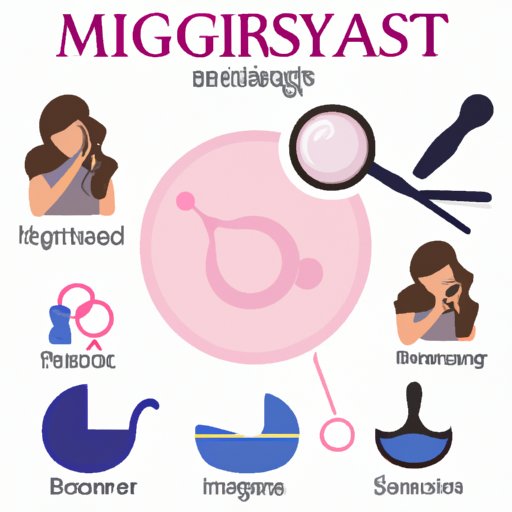
Introduction
According to the American College of Obstetricians and Gynecologists (ACOG), about 10-25% of all recognized pregnancies end in a miscarriage, and the actual number may be even higher as some women may miscarry before even realizing they are pregnant. Miscarriage can happen to any woman, and it can be emotionally devastating. It is important to understand what causes a miscarriage and what the early signs and symptoms are in case it should occur.
Understanding Miscarriage
A miscarriage, also known as a spontaneous abortion, is a pregnancy that ends naturally before the fetus can survive outside the womb. Most miscarriages happen in the first trimester, or before week 12 of pregnancy. However, miscarriages can happen later in pregnancy, although it’s less common.
There can be several causes of miscarriage, such as chromosomal abnormalities, hormonal problems, or problems with the uterus and cervix. It’s important to identify the underlying cause of a miscarriage to prevent future occurrences. There are also different types of miscarriage, including complete, partial, missed, and recurrent miscarriages. Each type requires different medical treatment and attention.
Early Signs and Symptoms of Miscarriage
While each woman may experience a miscarriage differently, there are some common early signs and symptoms to look out for which may include:
Spotting or bleeding
Spotting or bleeding from the vagina is one of the most common signs of a miscarriage. It can be light or heavy, and it may occur during or after sexual intercourse or physical activities. Bleeding may also be accompanied by clots or tissue discharge.
Abdominal pain or cramping
Mild to severe abdominal pain is another common symptom of miscarriage. It can feel like menstrual cramps or a constant dull ache. The pain may be felt in the lower back or pelvic area as well and can be accompanied by nausea, vomiting, or diarrhea.
Loss of pregnancy symptoms
Some women may notice that their pregnancy symptoms, such as breast tenderness, nausea, and fatigue, have suddenly disappeared. While it may not necessarily mean a miscarriage has occurred, it’s important to check with a doctor to rule out any potential complications.
Factors Contributing to Miscarriage
There are several factors that may increase the risk of a miscarriage, including:
Age
Women over the age of 35 have a higher risk of miscarriage as the quality of their eggs declines.
Health conditions
Health conditions such as diabetes, thyroid disorders, and autoimmune disorders can increase the risk of miscarriage. Infections and chronic illnesses may also play a role.
Lifestyle factors
Smoking, drinking alcohol, and taking illegal drugs can all increase the risk of miscarriage. Stress, anxiety, and poor nutrition can also contribute to a higher risk of pregnancy loss.
Preventing Miscarriage in the First Trimester
While not all causes of miscarriage can be prevented, there are things you can do to increase your chances of carrying a healthy pregnancy to term. Some tips include:
Tips for a healthy pregnancy
Eating a balanced and nutritious diet, getting enough rest and exercise, avoiding smoking and alcohol, and taking prenatal vitamins are all important for a healthy pregnancy.
Risk factors to avoid
Avoid risky behaviors such as drug use, exposure to hazardous chemicals and toxins, and certain medications that may be harmful to the developing fetus. It’s also important to manage any existing health conditions with the guidance of a healthcare provider.
Dealing with the Emotional and Physical Effects of Miscarriage
Experiencing a miscarriage can be emotionally and physically painful. It’s important to give yourself time to grieve and feel the emotions that come with the loss. Some tips for coping with the grief and self-care include:
Coping with grief and loss
Talking to a trusted friend, family member, or a therapist can help you cope with the emotional pain of miscarriage. Joining a support group or seeking out online resources can also provide comfort and understanding in this difficult time.
Self-care after miscarriage
In addition to taking time to rest and heal physically, it’s important to take care of yourself emotionally as well. Activities such as meditation, yoga, or other self-care practices can help boost your mental health and wellbeing.
Importance of Seeking Immediate Medical Attention
If you suspect a miscarriage, it’s important to seek immediate medical attention. Depending on the severity of the symptoms, the doctor may order tests such as ultrasound, blood work, or a pelvic exam. If necessary, they may also recommend medical procedures such as a D&C (dilation and curettage) to remove any remaining fetal tissue from the uterus.
When to call the doctor
If you experience heavy vaginal bleeding, severe abdominal pain or cramping, or feel lightheaded or dizzy, seek medical attention right away.
Types of medical procedures
A D&C (dilation and curettage) is a procedure where the doctor dilates the cervix to remove any remaining fetal tissue from the uterus. Medications such as Misoprostol can be prescribed to help the body naturally expel the tissue. In some cases, surgery may be necessary to remove the tissue or fix any problems with the uterus or cervix.
Conclusion
Experiencing a miscarriage can be one of the most difficult experiences a woman can endure. It’s important to understand what causes a miscarriage, what the early signs and symptoms are, and how to prevent future occurrences. Seeking support from loved ones, professionals, and online resources can provide comfort and understanding during this difficult time.




